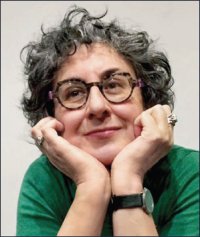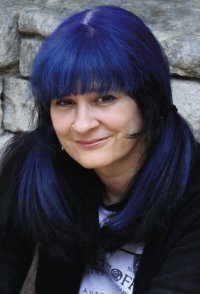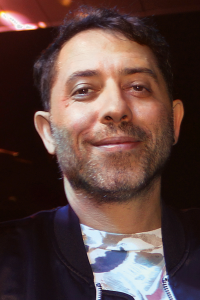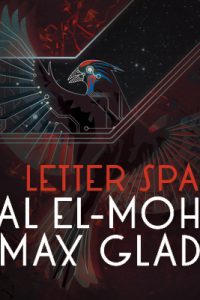Spotlight on: Ellen Kushner, Tremontaine
Ellen Kushner lives in New York City with her wife, the writer and teacher Delia Sherman. They have no cats, just plane tickets and theater stubs. After college, Kushner lucked into jobs as a fantasy editor for Jim Baen at Ace Books, and then for David G. Hartwell at Pocket/Simon & Schuster. She quit to write her first novel, Swordspoint, which took longer than she thought it would, so she supported herself writing Choose-Your-Own-AdventureTM books. She moved to Boston to become an announcer for WGBH public radio, later becoming the writer and host of the national series Sound & Spirit, which ran for ten years or so. With Holly Black, she co-edited Welcome to Bordertown, the revival of Terri Windling’s original shared world series. She has taught creative writing at Clarion and the Odyssey Workshop, and is a regular instructor at Hollins University’s Children’s Literature M.F.A. program. She is nearly always happy to see you.
You’re the creator of the Riverside series, which includes novels and stories written by you, in collaboration, and by other hands, most recently the Tremontaine serials. Tell us a little about the history of the Riverside series.When my first novel, Swordspoint, came out in the US in 1987, it was a weird outlier: a fantasy without magic! Set in a city, not a Tolkienian landscape! With queer characters in a largely bisexual society…! I didn’t do it on purpose. Or rather, I did – I just wrote what I wanted, and figured it would be a disaster.
Well, at the time, the book found its little audience. And it seems also to have been a stake stuck in the ground of the late ’80s, saying: ‘‘Hey, it’s OK to depart from tradition!’’ Since then, books of that kind in the genre have tended to be called either Fantasy of Manners or Historical Fantasy.
Swordspoint wasn’t the first to do any of the things I listed, but it was the noisiest, I guess. Anyway, people asked me when I would do the sequel, but I had a horror of repeating myself. So my next book was the rural, romantic, folkloric and musical Thomas the Rhymer (which won the World Fantasy and the Mythopoeic Awards).
But I missed my city. And I missed my characters – so I made a deal with myself: I was allowed to write about them, but only if I took a new approach each time.
The next book I started in the series occurred 15 years later. Same city, same characters (a little older), told from the viewpoint of a teenage girl. It would become The Privilege of the Sword – but at the time I was deep into my new career in public radio in Boston, and I set it aside.
A few years later, my friend Delia Sherman and I began a romantic relationship, and started making up what happened in the next generation. Delia was particularly interested in the history, mythology and academics of the world, and we ended up writing The Fall of the Kings together. That upset all the Swordspoint fans, because all their favorite characters were dead (though much spoken-of, which was part of the fun!). When it came out, my agent made me pull Privilege out of the drawer, and so that got finished and published as well.
I started getting nervous: was I, in fact, writing a series after all?? There were three novels, all set years apart, sure, but… would people call it a trilogy?
Fortunately the insightful and erudite Jo Walton unwittingly came to my rescue with a piece on Tor.com calling the series ‘‘a very odd family saga.’’
Saved my life. And also true: the next novel, a WIP I’m calling City Year, is about the bastard daughter of Alec from Swordspoint (she’s encountered by the reader in utero in Privilege), the angriest teenager in the world.
In between novels, I’ve written a fair number of short stories that tell about characters or situations referred to in the series – and, yeah, they’re all in slightly different styles. It’s a bitch: it also means I have to figure out just what a reader who’s never heard of Riverside needs to know in order to make each story stand on its own. Again, Delia came to my rescue by saying, ‘‘Just pretend you’re writing something set during the French Revolution. They don’t always need to know about Robespierre and Danton to make the story work.’’ She’s also fond of explaining Kings as ‘‘a historical novel about a place we made up.’’
Tremontaine, which premiered in fall 2015, takes another leap in time: It’s a collaborative serialized narrative set 15 years before Swordspoint.
The second season of e-book serial Tremontaine just concluded. Tell us how you started working with Serial Box on the project.
I’ve known Julian Yap since he was a college student, when he came to me at a World Fantasy Con holding out a fountain pen and his copy of Swordspoint. Since then, he’s gotten a folklore degree, a law degree, and worked in Obama’s Justice Department, which he left in 2014 when he had the vision of starting up a little e-publishing venture with some friends. His idea was to take the aesthetics, and, more importantly, the shape and structure, of the best of current TV series, and deliver the pleasure so many of us get from weekly enjoyment of an hour of well-written TV – or from binging at the end of the series when all the episodes turn out to be, essentially, stand-alone chapters in a complicated novel.
He’d planned to start small, with just one series (Bookburners) crafted by Max Gladstone. But someone – I think it was Naomi Novik – said Serial Box should launch with more than one series in hand, so Julian came to me asking if I would be interested in working on a Riverside serial. I decided it would be fun, but stipulated that it couldn’t take place during the time of any of the books, nor use any of my major characters. Setting it 15 years before Swordspoint works perfectly: we see some of the older, secondary Swordspoint characters in their prime as main characters, and explore a little of the origins of the Tremontaine family drama – and get to introduce a bucketload of new characters as well!
Talk about the collaborative process for creating the serial. Do the writers work closely together, or more independently? How much control do you exert as creator?
Yes, yes, and yes.
I write the opening and closing season episodes. The three staff writers write three stori – I mean, episodes each, and we have a couple of guest writers.
Before any writing gets done, Julian and staff convene in my living room for a Brainstorm Retreat with a giant whiteboard, a bunch of colored index cards, and vast reserves of bagels, smoked fish, Mountain Dew, potato chips, and chocolate.
Three days later, nobody’s dead, and we have the outline for the season, the rough contents of each episode, and have decided who’s going to write which one – and everyone goes home.
We have regular meetings on Google-chat, and all communicate madly on Slack, to make sure that 13 stand-alone episodes all dovetail with each other, the First Kiss doesn’t happen twice, the person who was stabbed in episode three doesn’t show up dancing a jig in episode five… and that something Terribly Clever that Tessa just thought of for episode nine is duly foreshadowed in Joel’s episode seven. The stories are edited mercilessly (Delia the first year, Juliet Ulman now and forever), then I step in to make sure that nothing I know about the world but somehow forgot to tell anyone hasn’t been compromised.
What’s been the most surprising part of having other people write in your world? The most satisfying? (How about the most frustrating?)
The other writers have made it more real. The world is already a great big stewpot of periods, books, and cities I love. But I’ve only explored certain corners of it. A real world is vast and full of complexities and contradictions. Alaya Dawn Johnson’s Kinwiinik chocolate traders come from another whole continent based on Meso-America, for which she has a passion and a helluva lot of knowledge. Malinda Lo will do any amount of research to get the science right, and is a cold-blooded killer. Mary Anne Mohanraj introduced a refugee sex-worker hotter than Vesuvius. We asked Tessa Gratton for some backstory notes on what we thought was a minor character, and she delivered an entire standalone novella set on a hitherto-unexplored island!
The Brainstorm really is like playing in the backyard when you were kids: There is a lot of waving of hands and jumping up and down going, I know! I know! There could be this party, right? But he shows up and challenges the guy and, and, and….
Most frustrating? They’ve all read my books. In fact, I chose them in part because they were fans. So, darlings: is there anything, anywhere in any of the books implying that the city has hackney carriages???? I mean, really! Also, darlings, this is not Downton Abbey: the Duchess Tremontaine does not have a butler! It’s a steward, like in the Elizabethan period. Is that so hard to understand? Stop calling Dumaine a butler, dammit!!! Oh, wait – is it Dumaine, or Tilson? Was it Tilson in Season One? Oh, shit, do we have to change it now…?
Can we look forward to a season three? How about other projects set in this world?
When we sat down to plot out season one, I said, ‘‘Let’s set this 10 years before Swordspoint,’’ and Julian said, ‘‘Er, actually, can we make it 15 years? I want to be able to do a five-season arc.’’ And I thought, Sure, fella, whatever you say – I’ll be amazed if this first season works!
Well, we have scheduled the Brainstorm Retreat for season three already, in February. And Julian says it’s time to figure out the arc through five. So I guess he was not so dumb after all.
Meanwhile, for those who will not read a serial online, Tremontaine (Season One) will appear in Spring 2017 from Saga Press.
Is there anything else you’d like our readers to know about you or the work you do?
I like cake, but pie has my heart.
I spent many years in public radio (at WGBH in Boston), and learned to be unafraid of public speaking. In fact, bring it on! Large groups energize me onstage, and I’m always excited beforehand but never nervous. It’s only afterwards that I start to gibber and worry that I was dreadful, dreadful, dreadful. Fortunately, my amazing wife Delia Sherman, enjoys my gigs, and so is almost always on hand to say, ‘‘No, you were fine.’’
I’ve recorded all three of the Riverside series audiobooks myself, because I am the luckiest author on the planet. My producer, Sue Zizza, casually asked if she could bring in some ‘‘actors she knows’’ to do voice cameos at certain points – and they happened to be some of today’s big audio talents. Two of them agreed to narrate the Tremontaine stories: an audio version accompanies the e-text in a way indistinguishable from magic. So the audiobooks’ original Duchess Tremontaine, Katherine Kellgren, reads all the duchess’s viewpoint sections in Tremontaine – while newcomer Sara Mollo-Christensen invented a whole new accent for the Kinwiinik – and Nick Sullivan (the villain in Swordspoint and the hero in Kings) narrates all the male POVs in Tremontaine.
When I was a kid, all my teachers said they wondered what I would do with my passion for acting, writing, and bossing people around.
I think Tremontaine finally answers that question.






